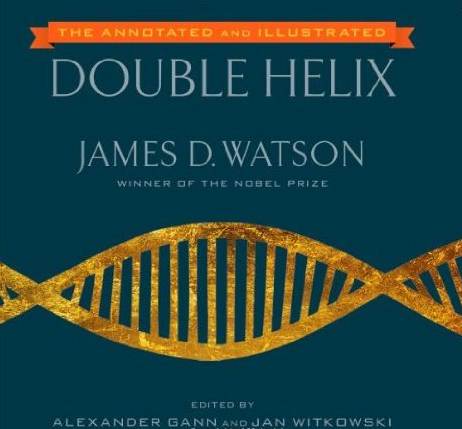As for many people in the molecular biology profession, my first reading of The Double Helix by James Watson was a revelation. I can’t recall how old I was – probably in my late teens. I had already decided I wanted to be a scientist, and the engaging, first-person account of such a pivotal discovery – nothing less than solving the structure of DNA and revolutionizing biology forever – pretty much sealed the deal for me.
In retrospect, I have mixed feelings about the work now – and I’m sure I’m not alone. Once you know a little more about what Rosalind Franklin was really like, and how certain plot points probably actually panned out, it’s difficult to look at Watson’s book in quite the same way again. Depending on whether you believe the ferocious defense by Franklin’s friend Anne Sayre or the more balanced biography by Brenda Maddox, you find out that Franklin was, at the very least, meanly lampooned as a person she was not, and at the worst, possibly stitched up and deprived for too many years of the scientific credit she deserved.
Nevertheless, the book remains an astonishing work of art: while it’s commonplace today to read fictionalized accounts of real scientists and historical discoveries – to make a novel out of a biography* – back in 1968 it was as far as I know, almost unique. No matter how I feel about Watson now, I recall being enchanted by his young narrator’s voice, rushing towards his destiny with humor, irreverence and a passion that leaps off the page.
To mark the 50th anniversary of the Nobel Prize bestowed upon Watson, Francis Crick and Maurice Wilkins for the discovery of the structure of DNA, Cold Spring Harbor Laboratory Press and Simon & Schuster (Editors, Alexander Gann and Jan Witkowski) have collaborated to produce a gorgeous coffee-table edition packed full of annotations, photos, letters and documents, some never before published, as well as a “lost chapter” from the original manuscript and a fascinating dissection of the controversy surrounding its original publication.
I have not read The Double Helix since that heady first time in my teens, so I look forward to sinking into it over the holidays and seeing whether Watson’s youthful charisma can overcome the darker knowledge of subsequent information.
*If you’re interested in fictionalized scientific tales, you can visit the LabLit List and take a look at anything labelled as “historical”. Personal favorites include The Unfixed Stars (on Clyde Tombaugh, the Kansas farm boy who discovered Pluto), The Sky’s Dark Labyrinth (on Kepler and Galileo) and This Thing of Darkness (on Fitzroy and Darwin).



Sounds like a good read, thanks for the tip. I also read The Double Helix a long time ago and have forgotten almost all of it, so well worth re-visiting now I think. My PhD supervisor was adamant that anyone reading it should also read Sayre’s book as a companion (which I confess I never did).
I really enjoyed Maurice Wilkins’ autobiography, The Third Man of the Double Helix. He is fairly circumspect about the whole London vs. Cambridge aspect, but makes some interesting comments on Franklin (mainly around how insular and protective she was). It’s a good counterpoint to the Watson tale, for sure.
Thank for the tip about Wilkins’ autobiography – I didn’t know about it. I wouldn’t necessarily recommend the Sayre book – I found it wonderful at the time (for recreational outrage purposes), but people say the Maddox account is more balanced and thorough. Franklin’s sister has also written a biography.
Sorry, can’t resist a plug, but you might remember I wrote something about Crick, Wilkins, Franklin et al a couple of years back over here. It was prompted by reports of the discovery of some of Crick and Wilkins’ correspondence, which I understand is in the new edition.
I have an early hardback edition of The Double Helix somewhere, which I recall was a present from my dad. I think I’ll buy him the new one for Christmas as a thank you.
Another perspective is given in Georgina Ferry’s biography of Max Perutz. Perutz’s role in the Franklin story shows him in rather a bad light.
I had the odd (for me!) experience of starting as a student at the LMB just as the TV drama had been screened, which I’d also seen, with the effect that everyone was talking about the portrayals of the people who, of course, they knew. (Max in particular was there.) I can’t remember what was said now, perhaps that’s for the good.
If you look there should be an account of RF’s work by Aaron Klug in Nature (or someplace like that). Thinking about it, there will probably be more than one. I’m not thinking of the 1968 paper, but more recent commentary-type pieces. Aaron was RF’s collaborator.
I read it during the first year of undergrad and had a very similar reaction – I’ll be very interested in how your re-reading goes!